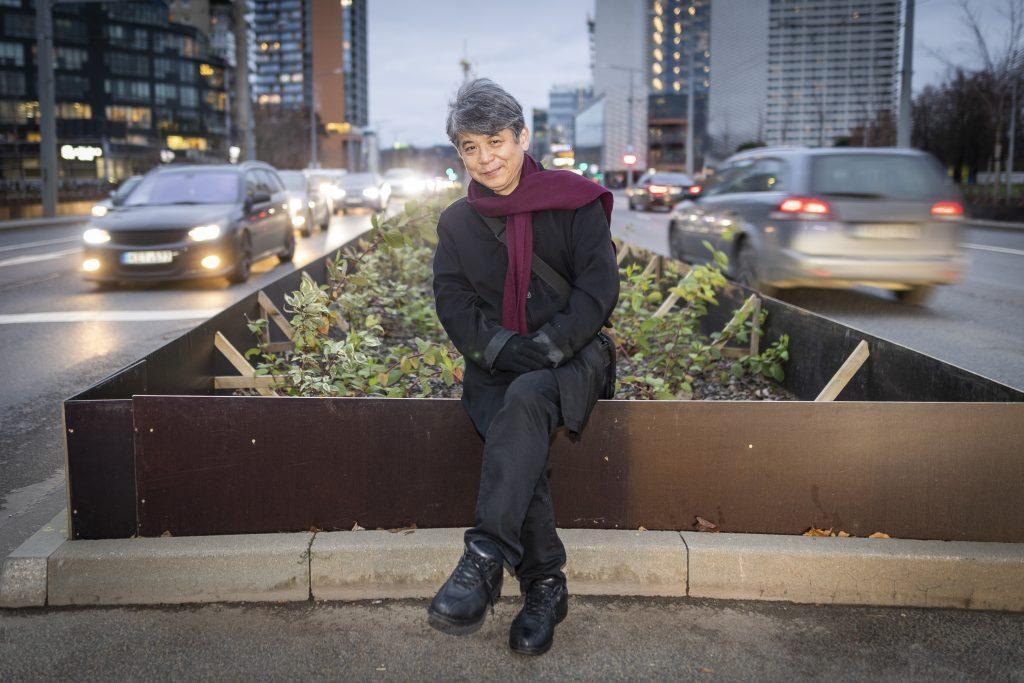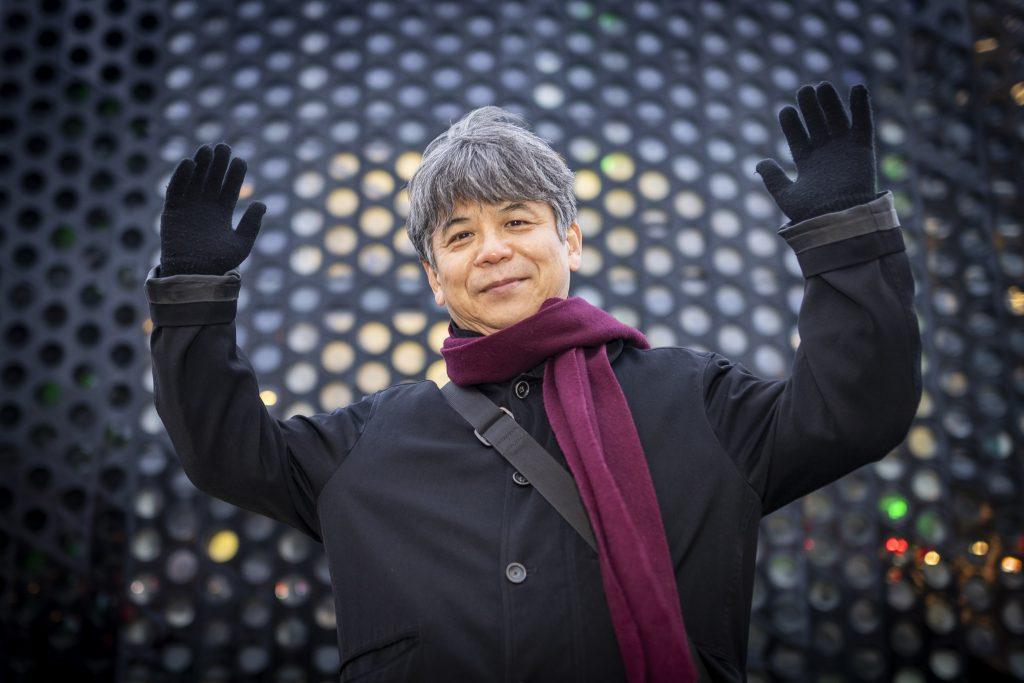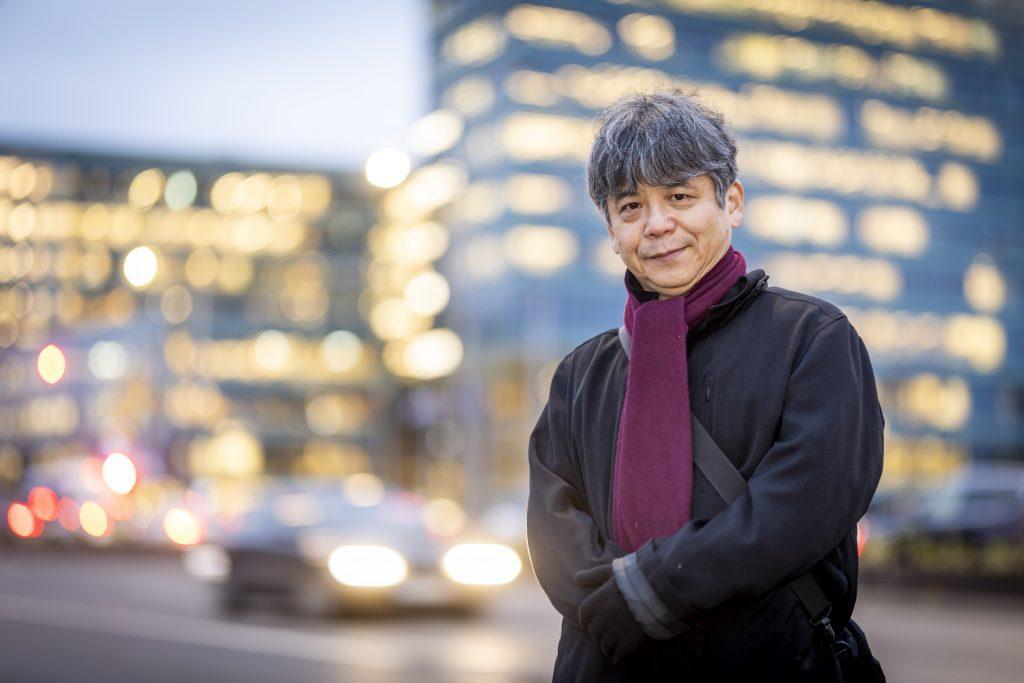Toshio Hosokawa, one of Japan’s must famous composers, was captivated by the spaces of Vilnius University and will dedicate his piece to them
This week, the sixth composer visited Vilnius for the Music for Vilnius project, during which some of the most prominent composers in the world today are creating compositions for specific spaces in the capital as a part of the city’s 700th anniversary celebration. Listeners will be able to hear the pieces during a series of concerts that will take place in the spring and summer of 2023. Toshio Hosokawa visited Lithuania for the first time, but he had already heard about our country and its music from his colleague, Lithuanian composer Justė Janulytė, who lives in Milan.
Read more about the project

“The history of Lithuania is definitely not ordinary”
As part of the Music for Vilnius project, the world’s most talented composers only manage to visit Vilnius for a couple of days, during which they try to see as many corners of the capital as possible and choose one to dedicate their composition to. And deciding is not easy – in addition to the historical spaces of the city, the project organisers usually also show them pieces of new history and culture as well as places in the sleeping districts of Vilnius.
“I had great guides and I really saw a lot of Vilnius. The National Gallery of Art was memorable, as was the former Lukiškės Prison – it’s amazing that jazz and rock concerts are held there now. I found Vilnius University and its history very interesting. I know that it played a very important role in your culture. I’ll probably choose one of its spaces with good acoustics as my project location. In Vilnius, I also learned some facts about the history of Lithuania, and it is definitely not ordinary. Back in Japan, my family tried to talk me out of going to Lithuania because there’s unrest in Europe, but I flew to Vilnius and I definitely don’t regret it – it’s a beautiful, safe, peaceful city, with nice people, good food, and a lot of great restaurants and cafés,” says the composer of his impressions.
“I wanted to get to know Lithuania better – this country is very musical”
The composer mentions that he learned more about Lithuania’s music scene from his colleague, composer Justė Janulytė: “The music here is very minimalist. It is probably associated with Lithuanian traditions, especially choral music – I really value that. Justė is a good friend of mine – she’s a young composer, a real rising star at the moment. After agreeing to participate in this project, the first thing I did was write to her and tell her how happy I was that I would be able to get to know Vilnius. I already knew that your country is very musical and has deep traditions, so I gladly accepted this invitation to write music for a particular place in the city. I think this project is fantastic because there will be seven composers from different countries participating in it – it’s amazing that I can contribute to it.”

Composer Justė Janulytė is also happy about her creative friendship with Toshio Hosokawa: “Combining European and Japanese traditions into a unique musical style in his work, he is the most famous Japanese composer in the world. I had the honour of teaching with him at an international composer master class in Poland a few years ago, and there, when presenting our work, we immediately sensed that we were like-minded, and that our musical values and nature-related creative philosophy are very close. In fact, Lithuanians’ connection with nature and our legacy of paganism have a lot in common with the Japanese world-view. Since then, Toshio and I have stayed in touch, sharing our new pieces, thoughts, and even photos of our puppies,” says Justė Janulytė warmly about her friendship with Mr Hosokawa.
“My music is born from the energy of nature”
Toshio Hosokawa studied in Germany, so European music had a significant influence on his work. Nevertheless, he is most inspired by classical Japanese music and culture, which helped form the composer’s unique musical style that is so recognisable in his operas and instrumental works.
“I took an interest in European music in my early youth, but after I starting my studies, I became more and more aware of the roots of my own culture. Now when I create or contemplate the idea and philosophy of music, I draw inspiration from traditional Japanese music, although European music remains important to me as well. Most of the time, creative ideas come from nature – I like oceans, mountains and forests; I have a house on top of a mountain, so that’s a good place for creative work,” says Mr Hosokawa.

The composer was born in Hiroshima, where his mother was living when an atomic bomb was dropped on the city in 1945: “I also create music so that nature and people’s destinies are not destroyed by wars. We probably all change over the years, and my work changes too – maybe it’s a little more ‘Japanese’ now. I was greatly influenced by the Japanese composer Toru Takemitsu and the Berlin-based Korean composer Isang Yun, who composed music in the Korean tradition – that inspired me a lot.”
Toshio says that his music is born from the deep energy of nature. “We admire the fragility and brevity of cherry blossoms, but the sound of music doesn’t last long either – it fades away and silence sets in.” It’s as if music comes from breathing – we breathe in and breathe out. And my melody is like Japanese calligraphy,” says Toshio Hosokawa about the subtleties of his music.
Performances dates: 6-7 of May in Vilnius university
Buy Tickets
You can learn more about the Music for Vilnius project that is being implemented by Meno Genas and the Lithuanian Ensemble Network on the project website, www.musicforvilnius.com.
